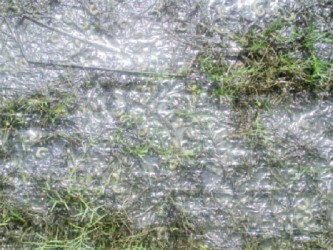The pungent stench which has wreaked havoc on the noses of the students and staff of the University of Guyana (UG) over the last couple of days is being caused by decaying beetle larvae, says Biology Lecturer Calvin Bernard.
During the latter part of last week, students and staff of the university began noticing a very foul odour although they could not determine where the smell was coming from. Some had speculated that it was likely being caused by stagnated water, while others speculated that raw sewage had leaked from the system and found its way to the surface, or that an animal had died somewhere and was decomposing.
But, none of these were responsible. As it turns out, the smell was being caused by the decaying bodies of dead insect larvae.

In a communiqué seen by Stabroek News, Bernard said he had been aware of the smell for some time but was not alarmed as it has happened in the past. While he admitted that he was initially unaware of what was causing it, he said he knew that it was not related to sewage.
However, he said, while making his way along the catwalk, which leads to the Spicy Dish Snackette, he discovered the dead and decaying bodies of beetle larvae and realised that this was the source of the unpleasant smell.
“These beetles are likely the small black species which at nights gather in large numbers around lit fluorescent lamps,” he speculated.
The beetles, he continued, have their colonies in the ground and the larvae usually remain there until their metamorphosis is complete. Incidentally, the heavy rains which have been experienced recently saturated the soil in which the larvae spend the latter part of their cycle. Since “the beetle larvae cannot tolerate prolonged submergence in water and are not significantly mobile, they have drowned,” he said.
He further said the large number of larvae and other insects had initially attracted large numbers of herons and egrets which gorged themselves on the insects for some time. “But the birds were not enough to consume all the larvae before they died and began to rot.” Since the birds would not feed on the rotting larvae, they were left to further decompose.
This would not have been the case if the rains had continued intensely for a significantly longer period, Bernard said, since the surrounding drains would have likely inundated the fields, and allowed fish to move about and feed on the insects.
Bernard was unable to say how long the larvae will take to decompose completely, but, he did say that if the situation remains unchanged “the larvae will continue to rot and release that pungent odour across the campus.”
Since “the issue is prolonged by the larvae carcasses resting in water,” he said, “the potential for bacteria growth is significant.”









